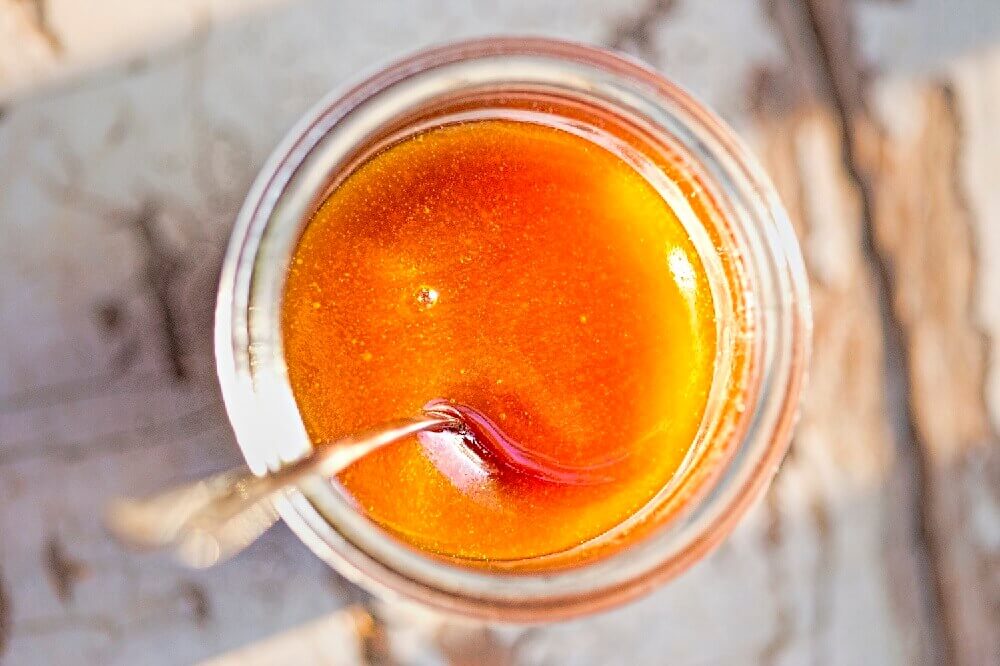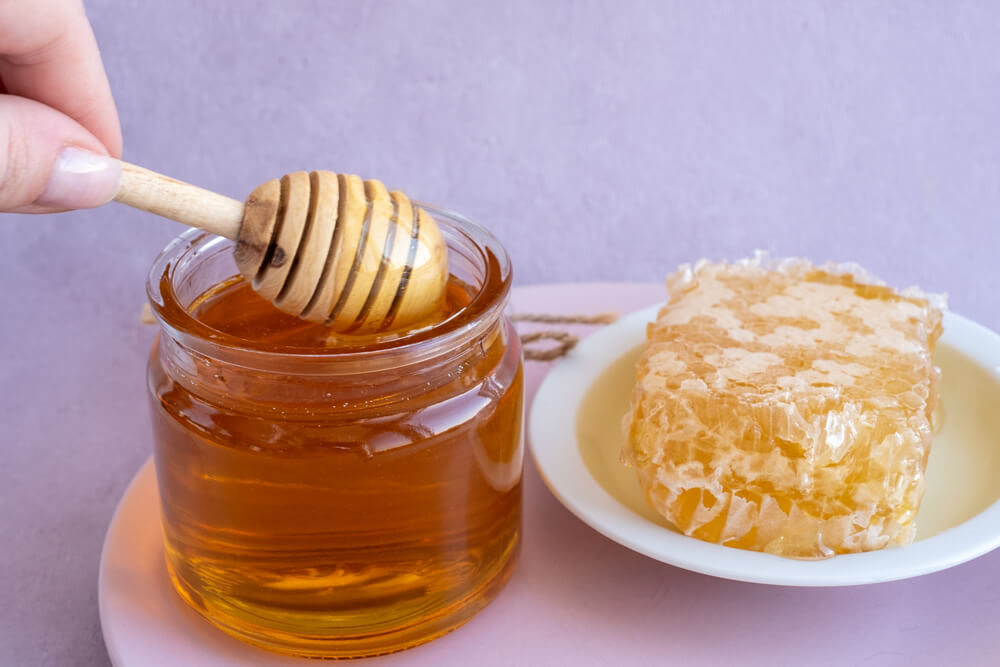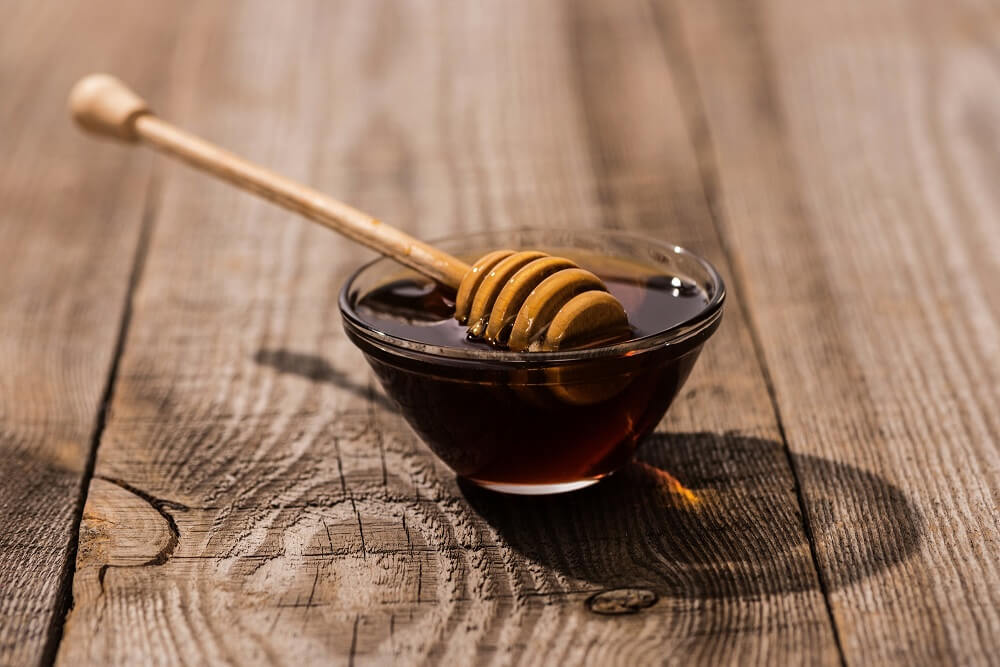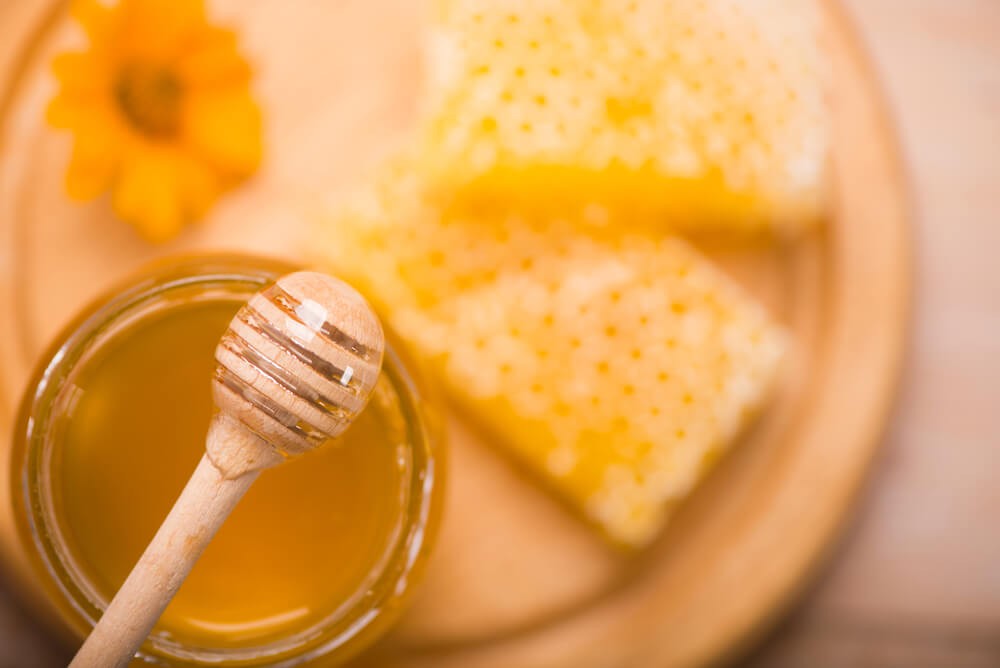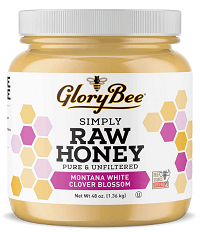Table of Contents:
How is Honey Useful?

Honey is useful for treating sore throats, coughs, inflamed skin, and cuts or scrapes.
In fact:
Honey has been successfully used in clinical trials to treat everything from upper respiratory infections to diabetic foot ulcers.
But there’s one caveat:
Raw honey offers health benefits, while processed honey does not.
Processed honey is commonly found in plastic teddy bear bottles at grocery stores. Unfortunately, overly processed honey gets stripped of its antioxidants during the pasteurization process.
Worse yet?
Processed honey is often diluted with sugars and other ingredients. As such, the FDA cautions that overly processed honey is no longer considered genuine honey.(1)
On the other hand?
Raw honey comes directly from the honey bee hive. It isn’t heated, overly filtered, or diluted like processed honey is. So it’s important to note that we’re talking about raw honey in this article – not the processed kind.
And here’s the important part:
You should ignore buzzwords like “real,” “natural,” “pure,” and “organic” when shopping for honey.
Instead, look for honey labels that state the honey is “raw” and “unfiltered.” That’s how you know you’re getting unprocessed honey full of antioxidants.
Speaking of antioxidants, let’s discuss how honey is useful:
Benefit 1: Raw Honey is a Reliable Cough Suppressant
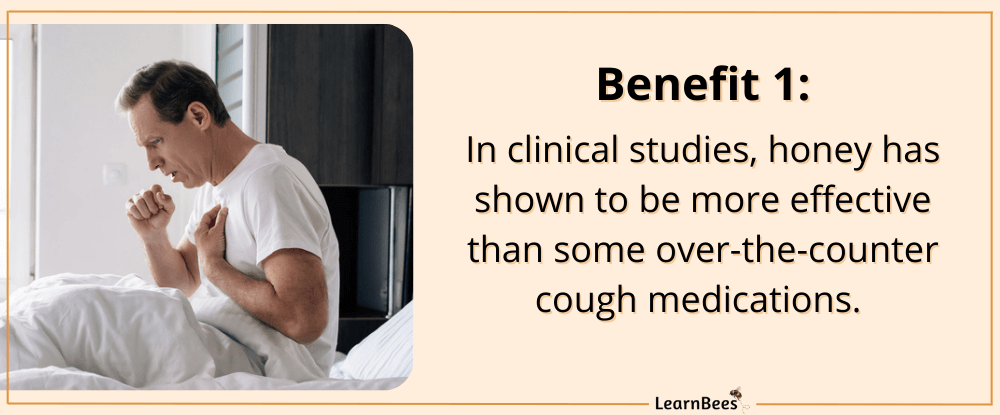
Coughing is a typical side effect for people suffering from upper respiratory infections. Coughing fits can lead to sore throats and often disrupt your ability to sleep.
This is where raw honey may be a solution.
Research demonstrates that honey can be a more effective cough treatment than diphenhydramine, an active ingredient in most cough medicines. More specifically, raw honey has been found to reduce the length of coughing spells.(2)
Furthermore, some over-the-counter cough syrups can have severe side effects, including dizziness, difficulty breathing, and nausea.
Raw honey doesn’t have any of these adverse effects.
Studies have also shown that honey improves sleep quality in children with coughs.(3)
Furthermore, multiple studies point to honey as a superior remedy for upper respiratory tract infections when compared to other treatments.(4)
Another study revealed that honey is an efficient remedy for relieving sore throat pain due to its antimicrobial and anti-inflammatory qualities.(5)
Benefit 2: Raw Honey is a Powerhouse for Wound Care

Raw honey treats some skin conditions with its potent antibacterial, antifungal, and anti-inflammatory abilities.
Honey can be used to spot treat minor acne and potentially address serious skin issues like diabetes-induced foot ulcers.
Clinical studies have revealed that honey is a highly effective remedy for partial-thickness burns and wounds that become infected after surgery.(6)
Another study uncovered that honey treated diabetes-related foot ulcers with a 97% success rate, which is especially critical as foot ulcers can lead to amputation if left untreated.(7)
Moreover, honey has been proven to be beneficial in treating numerous skin ailments such as herpes, eczema, and psoriasis.(8, 9, 10)
Raw honey may also help with the following:
- Skin rashes
- Sunburns
- Dry skin
- Acne
With these benefits, it’s no surprise that honey is often found in facial cleansers, lotions, and serums.
Benefit 3: Raw Honey Contains Antioxidants That Boost Health
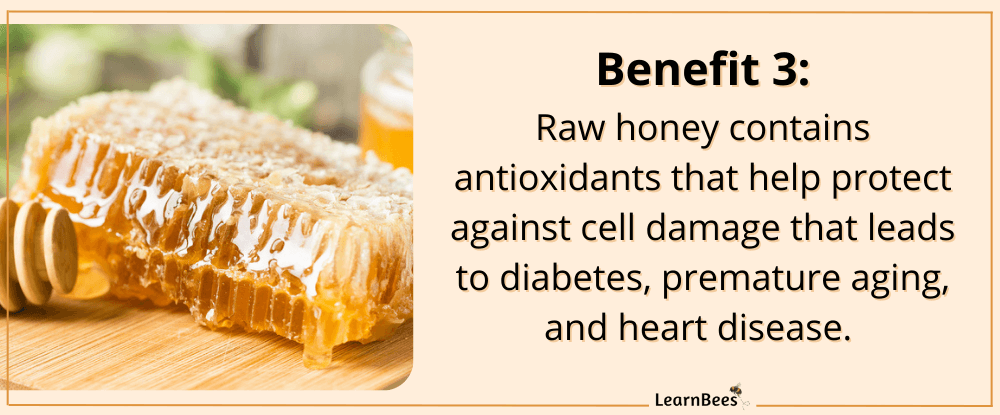
Honey’s remarkable health benefits stem from its high levels of antioxidants.
Antioxidants fight harmful molecules called free radicals in our bodies. Free radicals can cause diseases and illnesses such as cancer.
For one experiment, 25 people ate four tablespoons of buckwheat honey daily. Scientists took blood samples before and after the study.(11)
After 29 days, the study participants had heightened levels of polyphenols – which are powerful and protective antioxidants that can protect against disease.
Individuals who consumed greater amounts of honey were found to have higher levels of antioxidants in their bloodstream.(12, 13)
Recent findings illustrate that the antioxidants in raw honey possess anti-inflammatory properties that can safeguard against oxidative stress-related illnesses.(14)
Raw honey is packed with healthful properties and may include bee pollen and propolis, potentially offering a more comprehensive range of health benefits. A further study analysis demonstrated that honey might benefit the cardiovascular, respiratory, gastrointestinal, and nervous systems.(15)
Benefit 4: Raw Honey is Good for the Heart
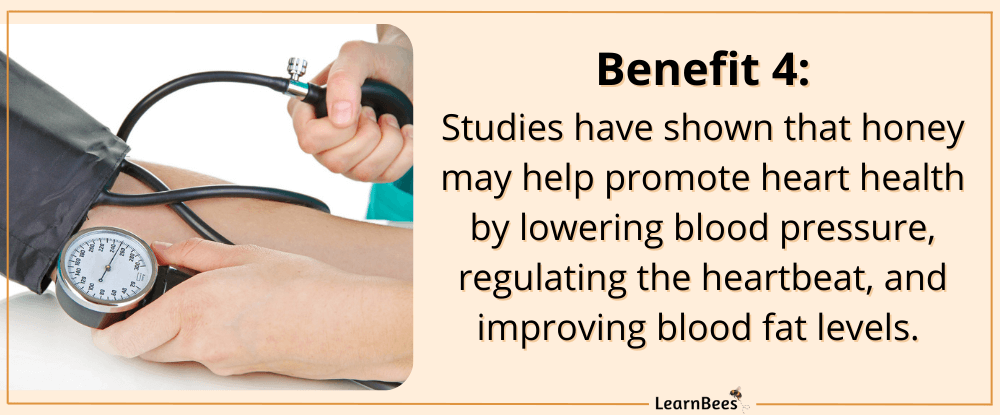
Not only is honey delicious, but it also has the potential to protect your heart from disease.
Research indicates that raw honey can benefit heart health, potentially lowering blood pressure and regulating your heartbeat. It may also help stabilize levels of fats in the bloodstream while protecting healthy cells from damage, resulting in improved heart function.(16)
Not only does raw honey contain beneficial minerals and vitamins, but it may also boost the potential of helping to maintain healthy cholesterol and triglyceride levels due to its content of bee propolis – a substance produced by honeybees from sap-producing plants.(17)
Is a Spoonful of Honey a Day Good for You?
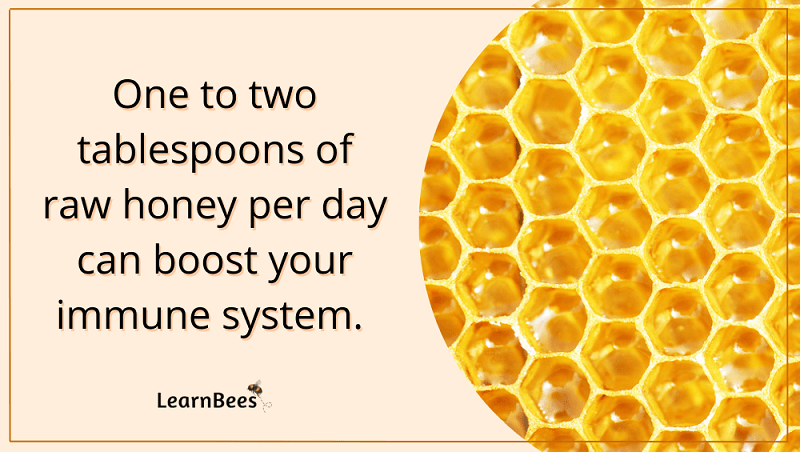
A daily spoonful of honey can be beneficial for your overall health.
Not only can it help boost your immune system, but its antioxidant content can deliver an array of benefits for the cardiovascular, respiratory, nervous, and gastrointestinal systems.
There are more than 300 kinds of honey. Each type can differ in color, smell, and taste.
For example, tupelo honey is known for its incredible sweetness, while buckwheat honey is less sweet and slightly earthy.
The type of honey you choose will depend on what flavor profile you’re looking for. For instance, sweeter honey is often used as a sugar replacement for baked goods. Meanwhile, people who don’t have a sweet tooth tend to gravitate towards milder types of honey.
But remember:
Honey is made up of mostly sugar. It also contains amino acids, vitamins, minerals, iron, zinc, and antioxidants. If you have a condition like diabetes, it’s always best to check with your doctor before making diet changes.
Potential Side Effects of Honey
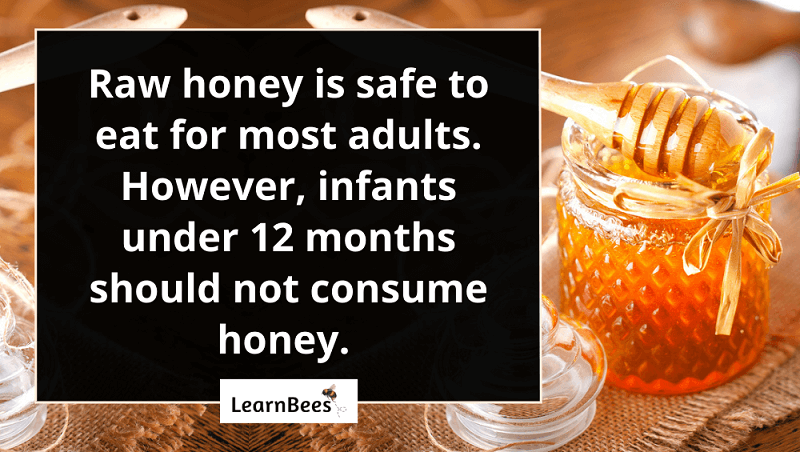
Raw honey has little to no side effects for most adults.
However, the American Academy of Pediatrics (AAP) cautions against giving honey to infants under 12 months old due to its potential to cause infant botulism. Botulism is an uncommon yet severe illness caused by bacteria present in certain foods.
As soon as children reach the age of 12 months, it’s typically safe for them to begin consuming honey. Their immune systems have matured enough to prevent potential bacteria or contaminants in this sweet treat.
For individuals with diabetes, honey should be consumed cautiously as it can elevate blood sugar levels. Before incorporating honey into your diet, consult with your doctor first.
FAQs On “How is Honey Useful?”
- What happens if I eat honey every day?
- What are the five uses of honey?
- When should you eat honey?
- What is the importance of honey to the brain?
- What kind of honey is healthiest?
- Can you eat honey straight from the jar?
- Does honey affect sleep?
- Is honey good for mental illness?
- Why does honey give you energy?
- How much honey per day is OK?
- What are the side effects of eating honey?
- Which is healthier, sugar or honey?
- Is local honey good for you?
- What are the benefits of eating honey at night?
What happens if I eat honey every day?
Honey is considered safe for most adults to consume daily. It can help ward off illnesses and potentially improve heart health. However, too much honey can cause weight gain or elevated blood sugar levels.
Therefore, speaking with your doctor before making any dietary changes is essential, especially if you have pre-existing health conditions.
—> Go back to the FAQs on “How is Honey Useful?”
More to Explore:
- Honey Pasteurization: Does it Ruin Raw Honey?
- Honey for Skin Benefits: Directions, Uses, & Risks
- 8 Scientific Benefits of Raw Honey
What are the five uses of honey?
Honey can be used for many things. Here are some of the most common uses:
1. Cooking and baking – Honey is a great natural sweetener for recipes that require sugar.
2. Immunity booster – Its antioxidant and antimicrobial content can help boost the immune system.
3. Soothed skin – Rich in anti-inflammatory benefits, honey has the potential to promote healthier skin.
4. Natural remedy – Honey can be used as a natural remedy for sore throats, digestive issues, and even wounds.
5. Energy – Honey has the potential to provide your body with natural energy when you’re feeling sluggish.
—> Go back to the FAQs on “How is Honey Useful?”
More to Explore:
When should you eat honey?
Honey is best enjoyed in moderation, like all other sweet treats. It can be eaten independently, added to cereal or yogurt, or included in recipes.
You can ingest it either morning or night, but due to its high sugar content, eating honey in the morning is recommended to avoid disturbing your sleep schedule if you’re sensitive to sugar.
—> Go back to the FAQs on “How is Honey Useful?”
More to Explore:
- The Top 3 Best Manuka Honey Brands
- Orange Blossom Honey: Uses, Benefits, & Risks
- Sourwood Honey: Uses, Benefits, & Risks
What is the importance of honey to the brain?
Honey has been studied for its potential benefits in cognitive function and memory. It contains flavonoids, which effectively improve learning and memory in animal studies. Additionally, its antioxidants protect the brain from oxidative stress and help reduce inflammation. These potential benefits make honey an excellent choice for healthy brain function.
—> Go back to the FAQs on “How is Honey Useful?”
More to Explore:
What kind of honey is healthiest?
Raw honey is the type of honey you should purchase if you’re looking for health benefits. It is unprocessed and minimally filtered, meaning it retains most of its nutrients.
Raw honey is also higher in antioxidants than processed or pasteurized honey, making it the healthier option.
As far as flavor is concerned, buckwheat honey has been widely studied for its health benefits. However, this doesn’t necessarily mean that buckwheat honey is better than other types of honey. The important thing is that the honey is raw and unfiltered.
—> Go back to the FAQs on “How is Honey Useful?”
More to Explore:
Can you eat honey straight from the jar?
Honey can be eaten straight from the jar using a clean utensil.
—> Go back to the FAQs on “How is Honey Useful?”
More to Explore:
Does honey affect sleep?
Honey can potentially help with sleep if eaten in moderation. It contains small amounts of melatonin, which helps regulate the body’s sleep-wake cycle.
However, if you are sensitive to sugar, it may be best to avoid eating honey too close to bedtime as it can cause an energy spike and disrupt sleep.
—> Go back to the FAQs on “How is Honey Useful?”
More to Explore:
Is honey good for mental illness?
Honey is not a substitute for the medical treatment of mental illness. We recommend consulting with a doctor for proper treatment of mental conditions.
—> Go back to the FAQs on “How is Honey Useful?”
Why does honey give you energy?
Honey is a natural source of energy due to its high sugar content. The sugars in honey are easily absorbed by the body, providing a quick energy source.
Additionally, honey contains small amounts of vitamins and minerals that can help boost energy levels. However, it’s important to remember to eat honey in moderation, as consuming too much can lead to weight gain and elevated blood sugar levels.
—> Go back to the FAQs on “How is Honey Useful?”
How much honey per day is OK?
This depends on the individual. For example, people with diabetes should limit their intake of honey and may need to consume less honey than those without the condition.
However, eating one to two tablespoons of honey daily is safe for most individuals.
—> Go back to the FAQs on “How is Honey Useful?”
What are the side effects of eating honey?
Too much honey can lead to weight gain and elevated blood sugar levels. Additionally, eating honey could trigger an allergic reaction if you are allergic to pollen. Honey should also not be given to children under 12 months old, as it can lead to infant botulism.
—> Go back to the FAQs on “How is Honey Useful?”
Which is healthier, sugar or honey?
Raw honey is healthier because it contains antioxidants, minerals, and enzymes. However, like sugar, honey should still be consumed in moderation.
—> Go back to the FAQs on “How is Honey Useful?”
Is local honey good for you?
Local honey can be good for you if it’s raw honey. Raw honey is unprocessed, meaning it retains its nutritional value. Look for labels that say “raw” and “unfiltered.” Or if you’re buying from a local beekeeper, ask them if the honey is raw to confirm.
—> Go back to the FAQs on “How is Honey Useful?”
What are the benefits of eating honey at night?
Eating honey before you go to bed may help you sleep better. This is because honey has a bit of melatonin, which helps your body regulate its sleep cycle.
Honey can also help sore throats, as it has antimicrobial properties. Honey can also help coat the throat and soothe irritation from coughing.

